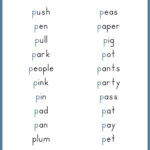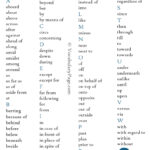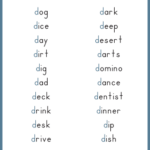Words That Start With Pre
1. Precede
2. Prejudice
3. Precaution
4. Preconception
5. Preoccupation
6. Preposition
7. Precedent
8. Premonition
9. Prequel
10. Prearrange
11. Precautionary
12. Predicament
13. Predecessor
14. Preemptive
15. Premiere
16. Preschool
17. Prescription
18. Predestination
19. Predict
20. Prejudgment
21. Preconceive
22. Predispose
23. Preservation
24. Preeminent
25. Preface
26. Prefabricated
27. Preoperative
28. Prevalent
29. Presuppose
30. Pressurize
More About Words That Start With Pre
Title: Unleashing the Power of Words: Exploring the World of ‘Pre’ Words
Introduction:
Welcome to an exciting exploration of the enchanting world of words that start with ‘pre’! As writers, word enthusiasts, or simply curious minds, it is a joyous endeavor to unravel the profound impact these syllables bring to our language. The sheer versatility and richness of vocabulary starting with ‘pre’ open a gateway to vivid imagery and nuanced expressions, making our communication more engaging and profound. Join me on this linguistic journey as we delve into the fascinating array of ‘pre’ words and discover their significance in our daily lives.
When one encounters words such as “prelude,” “preeminent,” or “prestigious,” there is an immediate sense of dignity and sophistication. The prefix ‘pre,’ derived from the Latin word “prae,” carries a powerful connotation, signifying ‘before,’ ‘prior,’ and ‘in advance.’ In English, this syllable serves as a linguistic catalyst, effortlessly enhancing the meaning and depth of the words it accompanies.
These ‘pre’ words often carry a sense of anticipation, hinting at something to come or a preparation in progress. They have the ability to captivate our imagination and invite us to participate in the unfolding story behind the words. Whether it be in poetry, prose, academia, or everyday conversations, the addition of ‘pre’ captivates our senses and offers numerous possibilities for creative expression.
One cannot ignore the role ‘pre’ plays in the realms of time and chronology. Words like “predate” and “premature” redefine our perception of time, reminding us that events or conditions can occur before their expected or usual time. Through linguistic nuances, ‘pre’ allows us to contemplate the delicate balance between the past, present, and future, often taking us on unexpected mental journeys.
Furthermore, ‘pre’ words have the power to inject a sense of cautionary wisdom into our narratives. Consider terms such as “precautionary” or “preservative,” which remind us of the importance of preparation, safeguarding, and taking measures in advance to prevent unwanted consequences. They serve as friendly reminders in our journeys to plan, protect, and preserve aspects of our lives, whether they be physical, mental, or emotional.
Delving deeper into the world of ‘pre’ words reveals the vast spectrum of emotions and experiences they encapsulate. Words such as “preference,” “prejudice,” or even “preference” prompt us to explore the realm of personal choices, biases, and predilections that shape our individual perspectives. By acknowledging these words, we heighten our understanding and appreciation of diverse viewpoints, thereby fostering empathy and inclusivity within our communities.
The application of ‘pre’ extends beyond personal experiences and into the realm of progress and advancement. Words such as “prestige,” “prestigious,” and “preeminent” embody the pursuit of excellence and success, motivating us to strive for greatness in our respective fields. The prefix ‘pre’ imbues these words with an innate sense of aspiration, inspiring us to push our boundaries and achieve the extraordinary.
In conclusion, exploring the world of ‘pre’ words unlocks a Pandora’s box of linguistic treasures, presenting an immersive journey for enthusiasts of language and literature. The captivating allure and wide array of emotions encapsulated by these words serve as an ever-present reminder of the power words possess. They enable us to paint vivid pictures, express complex emotions, and share our thoughts effectively. As we embark on this exploration of ‘pre’ words, let us embrace the boundless beauty and potential they bring to our experiences, conversations, and written expressions.
Words That Start With Pre FAQs:
Q1: What is the meaning of the prefix “pre-“?
A1: The prefix “pre-” means before or prior to.
Q2: What are some words that start with “pre-“?
A2: Some examples of words that start with “pre-” are prescribe, preview, prehistoric, prepay, prelude, preposition, prepare, preschool, preface, and prewar.
Q3: What is the difference between “pre-” and “post-“?
A3: The prefix “pre-” implies before, while the prefix “post-” implies after. For example, “prepaid” means paid before, while “postpaid” means paid after.
Q4: Can “pre-” be used as a standalone word?
A4: No, “pre-” is a prefix and is typically attached to a base word.
Q5: Does “pre-” always mean the same thing?
A5: Although “pre-” commonly means before, it can have variations in meaning depending on the context. For example, in the word “preconception,” it means prior to the act of conceiving.
Q6: What are some words that start with “pre” but have a different pronunciation?
A6: Words like “pretzel” and “preposterous” start with “pre-” but are pronounced differently, emphasizing the sound of the succeeding letters.
Q7: Can “pre-” be added to any word?
A7: “Pre-” can be added to many words to indicate something happening before, but it does not work with all words. Each word pairing needs to make sense and have a common meaning.
Q8: Is there an opposite to the prefix “pre-“?
A8: The opposite of “pre-” is the prefix “post-” which means after.
Q9: Are there any idioms or phrases that use the prefix “pre-“?
A9: Yes, phrases like “preaching to the choir” and “preparing for the worst” use the prefix “pre-” to emphasize an action or state happening before a related event.
Q10: Which part of speech is the prefix “pre-“?
A10: The prefix “pre-” does not function as a standalone part of speech. It is always used to modify the meaning of a base word in order to create a new word with a different meaning.
















